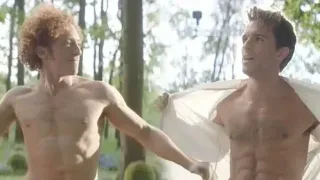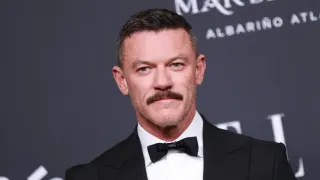May 29, 2024
In Critically Acclaimed 'Solo,' Théodore Pellerin Channels his Inner Drag Persona
Frank J. Avella READ TIME: 10 MIN.
Sophie Dupuis's third feature film, set in Montreal, centers on rising drag artist, Simon (Théodore Pellerin), who enjoys performing at his local club. Simon gets along with his fellow drag queens and has the constant support and love of his talented costume designer sister, Maude (Alice Moreault), as well as his accepting family.
Very early in the narrative Simon meets Olivier (Félix Maritaud), a handsome charismatic charmer, from France, and sparks fly. The two become inseparable. In addition, the sexy couple become a sizzling drag duo onstage, exciting the crowds. Alas, their dynamic creative and romantic relationship begins to show cracks as Olivier's domineering and destructive behavior emerges.
Meanwhile Simon's estranged opera superstar mother, Claire (Quebec screen icon Anne-Marie Cadieux), sweeps into town and parallels become obvious between mamma and lover. Simon must decide if he is going to continue to be mistreated by those who purport to love him, or if he will break free from toxic relationships.
"Solo" is a keen work that deals with desire, insecurities, relationship toxicity, and self empowerment. It opened to strong reviews last week in its first dates as part of its US release. It currently has a 91% on Rotten Tomatoes.
In the New York Times, critic Beatrice Loayza wrote: "'Solo' is a subtle snapshot into a gay man's profound yet familiar upheavals. Simon's drag spectacles may be intentionally fierce and operatic, but there's something refreshing about this drama's intimate scale and lack of interest in sweeping tragedies, especially in the context of queer cinema."
David Rooney in The Hollywood Reporter adds: "Despite its intermittent similarities to dated dramas about sad gay guys yearning to be loved, 'Solo' clearly comes from a place of authentic feeling, with characters that never ring false."
Key to the film's success is Pellerin's immersive performance. His Simon is incredibly nuanced and filled with contradictory and confused emotions. Simon is an assured powerhouse onstage and in drag but offstage, he's a vulnerable little boy. The 26-year-old Pellerin has worked across all three mediums since the age of 16, beginning with stage roles and short films. His feature film work includes Xavier Dolan's "It's Only The End of the World," Joel Edgerton's "Boy Erased," Eliza Hittman's "Never Rarely Sometimes Always," and Ari Aster's "Beau is Afraid." He's also appeared in Dupuis' first two films, "Family First" (Canadian Screen Award for Best Actor) and "Underground."
"Solo" brought him a Canadian Screen Award nomination for Best Lead Performance.
EDGE had the pleasure of chatting with Pellerin about "Solo."
EDGE: What was your prep work like for Simon?
Théodore Pellerin: It really started with the physicality... working with Gerard Dures, who's a choreographer/dancer... ballroom, voguing. The work started slowly with, like, learning to walk in heels. And is that actually possible? And slowly tapping into our own femininity and letting ourselves be comfortable in that and get accustomed to it and let it go through us... The work started quite early on... We had a lot of table work with Sophie and Félix. Then, rehearsals with everyone. So, it was a long process...
EDGE: You've starred in all three of Sophie's feature films to date. Can you speak about the collaboration with her, and specifically about how "Solo" came to be?
Théodore Pellerin: I was 18 when I auditioned for "Family First," 19 when we shot the film, and it was a really big turning point – an amazing part to have. It was the first time that I had a character who was so violent, sadistic, and had such an opportunity for layers and for playfulness. Also to tap into something very different than what I had been doing for a few years as a young actor... Sophie is so loving and generous as a director and as a writer. She is so in love with her actors, in the best possible way, so you feel incredibly safe under her eye. She also creates a space for real preparation with rehearsals, so when we get on set we've explored so much of it...
It was also a revelation of what work could be, and how much I enjoyed doing it. It was the first time where I truly felt like I could act, and I could be free. The preparation was so great and long I could then completely let go and act... And every part that she has given me has been incredibly terrifying, and difficult, and amazing to do. She is a real friend and anchor. And I can't believe how lucky I am to have had her and have her in my life as someone to work with, and to be given such a space to play.
EDGE: Let's discuss drag! Many amazing drag artists are these commanding, empowering presences on stage. But, sometimes, off stage they were kind of shy and reserved. That's a generalization, but I felt that about Simon. He got his power from getting in touch with his femininity.
Théodore Pellerin: I think a big, big aspect of the work for this one was to actually feel like I wasn't putting on a femininity or a certain way of moving or a certain way of being for the stage. That the stage and that space was where I felt my most comfortable and my most able to deploy and just be playful and feel confident and in my element. So, the personal work for me was allowing myself to feel that way in my femininity and not having it be something that came from outside, but having it be something that is really mine, and embracing what feels most natural and best.
EDGE: Your chemistry with Félix is beyond palpable. It's key to understanding why your character puts up with him for so long. Can you speak about how you, Félix, and Sophie created an environment where this was able to flourish?
Théodore Pellerin: Yeah. We wanted someone who was incredibly charismatic to play Olivier, because what can keep people in very toxic relationships is when you're infatuated with someone and everybody around you is [as well]. Everybody puts him on such a pedestal.
The process was just to get together and work on the script and talk through scenes. We did a month of that, just the three of us, have meetings and talk and improvise scenes, and try things out, and spend time together... Time really is key... And we got along. I love Felix, and that could have not happened. He could have hated me, too. But we liked each other. So, that was very helpful.






